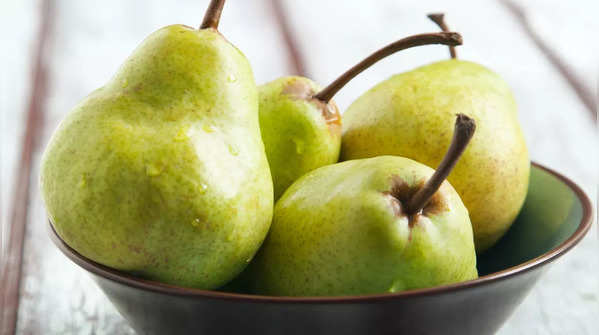5 reasons one must have pears for gut health

Is pear really good for health?
Fruits come in many shapes, sizes, and colours, each offering a unique combination of flavours and tastes. Pears, for example, are often made secondary to more popular fruits such as apples and oranges. On the contrary, pears become a powerhouse of nutrition. The sweet, juicy fruit that tickles taste buds also carries along a bounty of health benefits, mainly related to gut health. If you want to improve your digestive system through natural ways, start with pears. Here are 5 compelling reasons to add pears to your daily diet for optimal gut health. (Images courtesy:

Good source of dietary fibre
The primary reason for pears being a good food for gut health is because of their high fibre content. A pear can yield as much as 6 grams of dietary fibre in its medium size, equivalent to about 24 per cent of the adult's daily intake. The great majority of the fibre is insoluble, and insoluble fibres play a very significant role in maintaining regular bowel movements.
It gives bulk to stool, hence enabling easy passage through the gut, avoiding constipation. Though occasional infrequent use may give an effect of laxation being gentle, regular consumption of pears will maintain a healthy bowel movement cycle without developing gastrointestinal issues such as IBS and diverticulitis.

It supports healthy gut microbiome
Pears consist of prebiotic fibres that are the food source for the good bacteria housed inside your gut. This makes the bad bacteria consume prebiotic fibres in favour of a balanced healthy microbiome. A balanced gut microbiome, therefore, directly deals with issues of proper digestion of nutrients acquired by your body and immunities.
Apart from that, several studies have shown that a diverse microbiome acts as an anti-inflammatory and offers protection from many gut disorders, such as Crohn's and ulcerative colitis. Sources add that incorporating pears in your diet might assist in the good bacteria living in your intestines to thrive, which can further promote improved digestion and overall health of the gut.

Weight management support
Keeping an ideal body weight is very important for good gut health. As overweight conditions increase your risk for many digestive disorders, such as acid reflux, gallbladder disease, and liver problems, aiding you in maintaining your ideal weight range may contribute to your digestive health. Pears are low in calories but high in fibre. They help make you feel fuller for a longer period, which means you would eat or snack less on unhealthy foods.
This satiating effect plays a very big role in weight management, which impacts your gut directly. Controlling portion sizes and selecting high-fibre fruits, such as pears, will maintain the healthy weight with reduced pressure on your digestive system.

Natural source of antioxidants and anti-inflammatory compounds
Pears are sources of various antioxidants and high in vitamin C, vitamin K, and flavonoids that protect the gut from oxidative stress and inflammation. Many digestive issues ranging from mild discomfort to inflammatory bowel disease are caused by inflammation.
Free radicals cause decompensating damage to the lining of the cells in the gut. Anti-inflammatory compounds in pears calm the tract of digestion and reduce inflammation that causes conditions. Regular consumption of pears might be beneficial in managing chronic inflammation in the gut and ultimately promote digestive efficiency.

Hydration and digestive efficiency
Good hydration will ensure proper digestion, which pears can help to meet since it is comprised of about 84 per cent of water. Proper hydration ensures that food is passed through the digestive tract unobstructed, which would avoid bloating, constipation, and indigestion. Thus, the water content in pears coupled with the fibre of the fruit promotes better digestive efficiency, which tends to absorb nutrients from the food consumed by the body.
The process of eating the peels involves the utilization of pears in hydrating the body, which also acts as a slowing mechanism during digestion; it also triggers such cumbersome problems as constipation and slow bowel movement. And since in their dietary composition, apart from hydration, they hold much fibre that ensures a smoother digestive procedure and then overall better gut function.

Final words
Eating pears could be one of the easiest ways to having a healthier gut, as this fruit has high fibre content and offers prebiotic benefits to its role in weight management and curbing inflammation, hence why pears are considered true digestive allies. Raw, baked, or even blended into a smoothie, this is such an all-around versatile fruit whose health benefits go beyond merely aiding digestion.
While indulging in this fruit, you'll probably enjoy all the long-term beneficial gut and general health impacts while integrating pears into your diet. The next time you pop into the grocery to buy some fruit, don't walk past that modest pear. Your gut will thank you!









